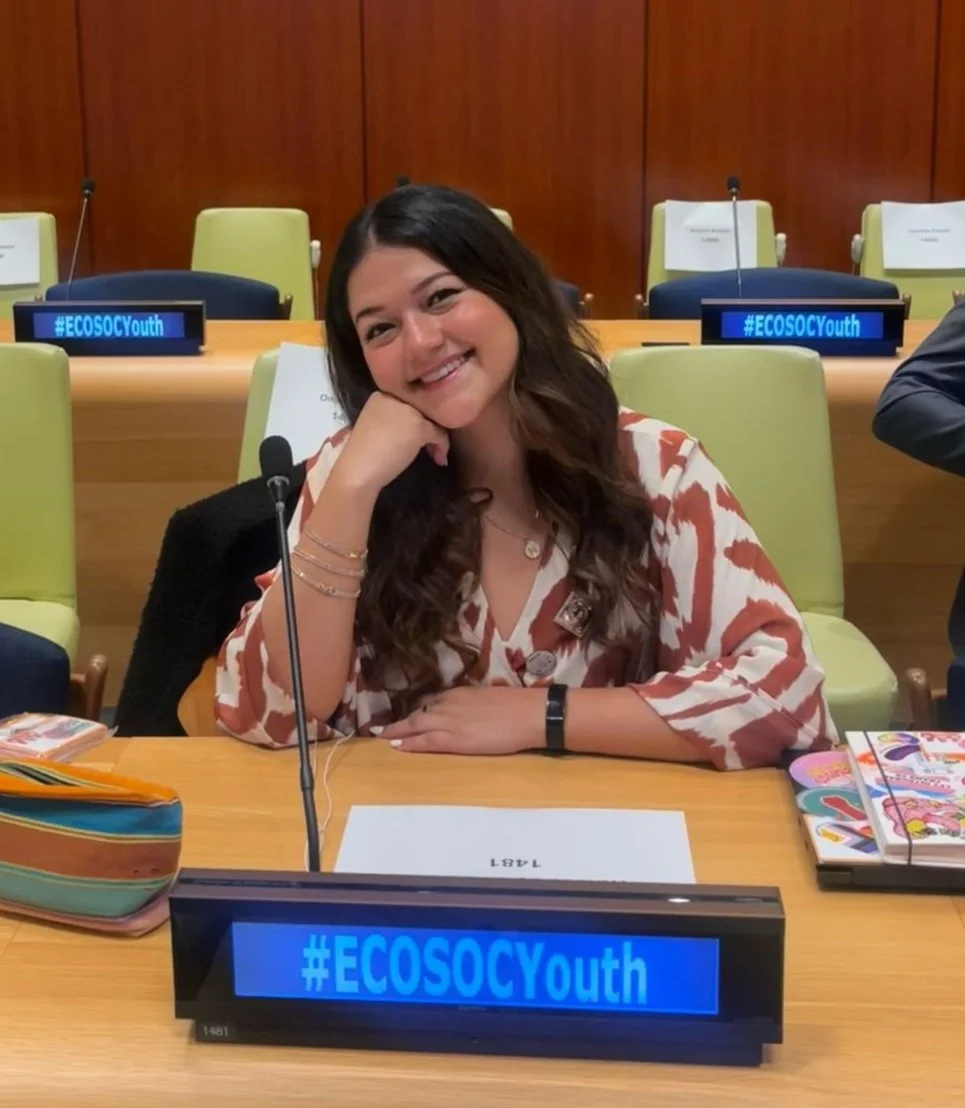From Guatemala to the UN: A Call to Trust and Empower Youth
One Floor Up, One Step Closer: Speaking Out at the ECOSOC Youth Forum
by Natalia de León Tello
Despite feeling nervous, I decided to speak.
I was standing on the exclusive floor of the United Nations chamber during the ECOSOC Youth Forum—a level reserved for those with microphone access. Just one floor above me, in the same room yet in an entirely different reality, sat about 200 adolescents and young people. None of them had microphones. None of them had the option to speak. And outside, the line continued—more than 100 young people, waiting for a chance to simply be present in the room. Hoping. Watching. Holding on to the idea that perhaps, next time, they might be heard.
This moment was about more than nerves or personal courage. It was a sharp, visual metaphor for how access is still deeply restricted in global and bureaucratic spaces.
Yes, youth are invited. Yes, youth show up—brimming with knowledge, experiences, and the determination to reshape our futures. But all too often, the systems that claim to center us only offer symbolic participation. A seat at the back. An observer badge. A panel at the very end of the agenda. Rarely the microphone.
I was one of the lucky few. And I felt the weight of that luck, that responsibility.
Natalia’s intervention at the ECOSOC UN Youth Forum on April 15.
In my intervention, I spoke from the heart. I shared a statistic that should break us all: from 2018 to 2024, over 14,969 girls aged 10 to 14 have given birth in Guatemala. These are not just numbers. These are children—forced into adulthood by systems that have failed them.
“Yes, youth are invited. Yes, youth show up—brimming with knowledge, experiences, and the determination to reshape our futures. But all too often, the systems that claim to center us only offer symbolic participation.”
I reminded the room that when children are giving birth to children, the urgency is undeniable. We cannot delay action. We need comprehensive sexuality education, access to quality and adolescent-friendly sexual and reproductive health services, and—most critically—we need to go beyond including youth in name only. We must be trusted, listened to, and empowered to shape the very policies that affect our lives.
Yesterday, I was lucky. I had a seat. I had a voice. So I used it—for the 200 youth on the second floor who weren’t given a chance. For the 100 outside, still believing in the possibility of being seen. For the thousands of youth who wanted to be at the ECOSOC Youth Forum but were not able to, due to visa restrictions, financial barriers and more. For the young girls in Guatemala and beyond, whose lives are being shaped by silence and inaction.
Youth participation cannot be symbolic. It must be structural. It must be real.
Our voices are not accessories to the process—they are essential to justice, to progress, and to sustainable change.
Natalia’s Full Intervention Transcript
Hello, everyone. I am Natalia de León Tello, Communications and Youth Coordinator for Family Planning 2030 in Latin America and the Caribbean. I am originally from Quetzaltenango, Guatemala.
In Guatemala, between 2018-2024, 14,969 girls aged 10-14 gave birth to children. Children giving birth to children should disturbe us and move us to action. Girl and teenage pregnancies remain a rampant issue, not only in Guatemala, but in all of Latin America. I imagine a 2030 where this is no longer a reality. My vision for the world in 2030 is one where every young person has access to comprehensive sexual and reproductive health services, education, and rights. A world where no child is forced into motherhood due to lack of education, access to contraception, or gender inequality.
Sexual and reproductive health and rights (SRHR) are essential to achieving the SDGs, particularly in eradicating poverty (SDG 1), ensuring health and wellbeing (SDG 3), ensuring quality education (SDG 4), achieving gender equality (SDG 5), and reducing inequalities (SDG 10). When young people have access to comprehensive SRHR services, they can make informed decisions about their futures, complete their education, and participate fully in economic and social life.
I imagine a 2030, where the voices of young people, especially those from rural, Indigenous, and underserved communities, are central in shaping policies and programs. I envision a world where youth leadership is valued, and young advocates are driving the change they wish to see. By creating platforms for young advocates to share their stories, engage in advocacy, and build connections, we should aim to foster a more inclusive approach to SRHR, ensuring that all young people can make informed decisions about their health and future.



